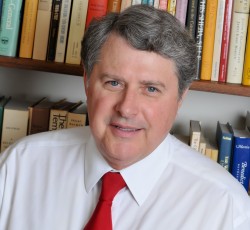The Many Books of James Kirby Martin
This week brought the news that James Kirby Martin has died at the age of eighty-one.
Earning his doctorate at the University of Wisconsin, which used to have a huge American history department, Martin taught at Rutgers before moving to the University of Houston.
In 2018, more than thirty years later, he retired as the Hugh Roy and Lilli Cranz Cullen University Professor of History. He’d held visiting appointments along the way, of course.
When I started researching the actual war part of the Revolution, I knew I was going to use James Kirby Martin’s books. His biography Benedict Arnold, Revolutionary Hero: An American Warrior Reconsidered is an excellent scholarly dig into well-trodden ground, and his edition of Joseph Plumb Martin’s memoir, titled Ordinary Courage, is probably the best.
Martin and Mark Edward Lender wrote A Respectable Army: The Military Origins of the Republic, 1763-1789, as well as Drinking in America: A History, 1620-1980, and they edited Citizen Soldier: The Revolutionary War Journal of Joseph Bloomfield.
Then I found Martin was also coauthor with Joseph T. Glatthaar of Forgotten Allies: The Oneida Indians and the American Revolution. Collaboration seems to have been one of his skills.
And those are just some of his books. His oeuvre extends from Men In Rebellion: Higher Governmental Leaders and the Coming of the American Revolution to Insurrection: The American Revolution and Its Meaning, as well as edited collections. One of his retirement projects was a novel written with Robert Burris about an entirely different period of history.
At the time of his death, Martin was still working. His Revolutionary War projects included a book about Fort Ticonderoga and a study of just war theory. I hope collaborators can complete those projects.
It wasn’t till after I’d read some of James Kirby Martin’s books that I had the pleasure of meeting him at a conference produced by America’s History, L.L.C. Later I also saw him at the Fort Plain Museum conference. Because he studied the actual war part of the Revolution, Jim Martin knew that his work attracted a lot of interest outside the academy, and he was happy to chat with readers and researchers from all walks of life. We’ll miss him.
Earning his doctorate at the University of Wisconsin, which used to have a huge American history department, Martin taught at Rutgers before moving to the University of Houston.
In 2018, more than thirty years later, he retired as the Hugh Roy and Lilli Cranz Cullen University Professor of History. He’d held visiting appointments along the way, of course.
When I started researching the actual war part of the Revolution, I knew I was going to use James Kirby Martin’s books. His biography Benedict Arnold, Revolutionary Hero: An American Warrior Reconsidered is an excellent scholarly dig into well-trodden ground, and his edition of Joseph Plumb Martin’s memoir, titled Ordinary Courage, is probably the best.
Martin and Mark Edward Lender wrote A Respectable Army: The Military Origins of the Republic, 1763-1789, as well as Drinking in America: A History, 1620-1980, and they edited Citizen Soldier: The Revolutionary War Journal of Joseph Bloomfield.
Then I found Martin was also coauthor with Joseph T. Glatthaar of Forgotten Allies: The Oneida Indians and the American Revolution. Collaboration seems to have been one of his skills.
And those are just some of his books. His oeuvre extends from Men In Rebellion: Higher Governmental Leaders and the Coming of the American Revolution to Insurrection: The American Revolution and Its Meaning, as well as edited collections. One of his retirement projects was a novel written with Robert Burris about an entirely different period of history.
At the time of his death, Martin was still working. His Revolutionary War projects included a book about Fort Ticonderoga and a study of just war theory. I hope collaborators can complete those projects.
It wasn’t till after I’d read some of James Kirby Martin’s books that I had the pleasure of meeting him at a conference produced by America’s History, L.L.C. Later I also saw him at the Fort Plain Museum conference. Because he studied the actual war part of the Revolution, Jim Martin knew that his work attracted a lot of interest outside the academy, and he was happy to chat with readers and researchers from all walks of life. We’ll miss him.


No comments:
Post a Comment